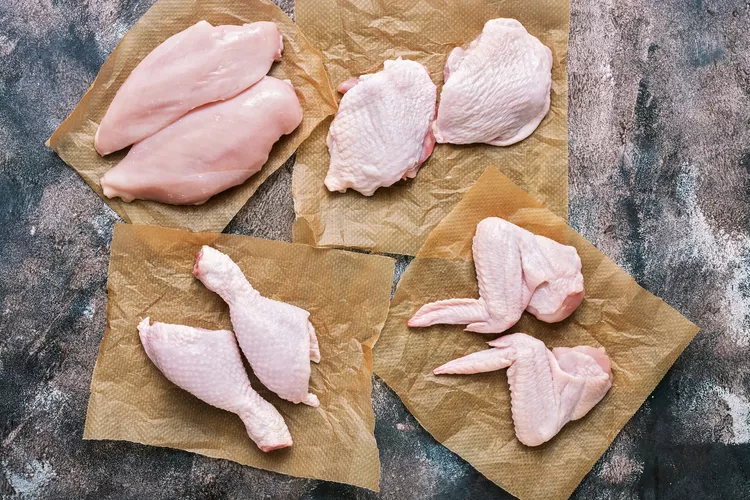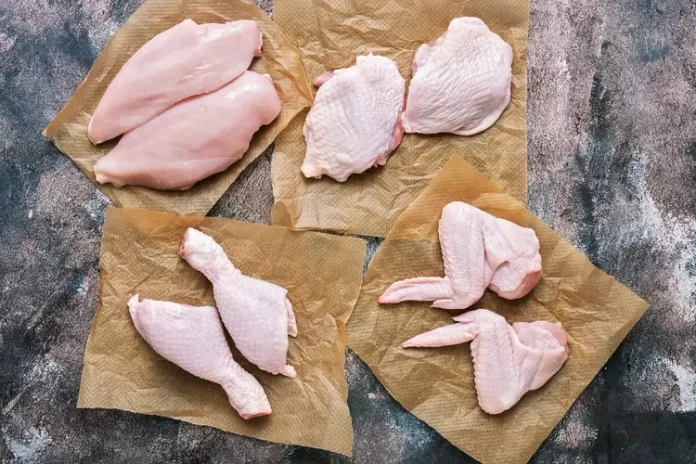
Are you in the habit of washing chicken before cooking? Is it a necessary step?
Across TikTok, Reddit, and X, there are advocates for rinsing chicken under water, claiming that it helps eliminate potentially harmful bacteria on the meat.
Contrary to this popular belief, health agencies contend that this practice is ineffective.
According to the Centers for Disease Control and Prevention (CDC), washing chicken serves no purpose.
Not only is washing chicken unnecessary, but it might also do more harm than good, as Darin Detwiler, PhD, an author, consultant, and professor of food policy at the Northeastern University College of Professional Studies, pointed out to Health.
“Cleaning a bird? All you’re doing is cross-contaminating the rest of your kitchen with pathogens,” he explained. “You’re not actually doing anything that adds food safety value.”
Cooking Raw Chicken Is the Safest Way to Avoid Foodborne Illness
Just because there’s no need to wash your chicken doesn’t mean you should overlook food safety precautions.
According to the CDC, approximately a million Americans fall ill each year due to contaminated poultry, with Salmonella being the primary concern in these cases.
The CDC estimates that around 1 in 25 packages of chicken is tainted with Salmonella.
While not all these illnesses can be directly linked to chicken, Salmonella alone causes approximately 1.35 million infections, 26,500 hospitalizations, and 420 deaths annually in the U.S.—surpassing the impact of any other bacteria.
Salmonella infection typically manifests as four to seven days of diarrhea, fever, and stomach pain. In rare instances, the bacteria can spread to other body parts, such as the blood, joints, or brain, leading to severe disease.
While it’s understandable that people may want to take precautionary measures, such as washing chicken, to avoid Salmonella poisoning, it’s crucial to note that rinsing off chicken won’t eliminate pathogens, as emphasized by Detwiler.
“People often believe they can wash off bacteria, but the safer approach is to cook it thoroughly,” explained Ciara Lundy, RDN, an inpatient clinical dietitian at Mayo Clinic in Arizona, in a statement to Health. “If they cook their chicken to 165 degrees, that should eliminate all bacteria.”
Rinsing Chicken Actually Increases Your Risk of Food Poisoning
Researchers have shown that washing chicken “spreads pathogens all over your sink and around the faucet and the handle and the sides,” Detwiler explained.
In a U.S. Department of Agriculture observational study, participants were asked to prepare raw poultry and a garden salad. Researchers found that 60% of those who decided to wash their chicken had bacteria in their sinks. And 26% of those who washed their poultry ended up causing cross contamination: Bacteria from the poultry found its way onto their lettuce.
“It causes more problems than it solves,” said Detwiler.
The idea of washing chicken seems to stem from cooking methods that people learned from parents or grandparents, Detwiler explained.
A small 2021 survey found this to be true—participants said their “chicken preparation methods were primarily influenced by family.”
Detwiler explained that generations ago, it was necessary to wash chicken before it was prepared, since people were more frequently slaughtering or plucking their own chickens.
However, in our modern day, this has become largely obsolete.
“We’re buying birds that have been, if you will, manufactured and packaged,” said Detwiler. “In terms of the bird that we buy for cooking, it is prepared and packaged for us to be able to literally remove it from the bag and put it into the oven.”
Another possibility is people simply do it out of habit, Lundy explained, lumping raw poultry in with other grocery store ingredients that are usually washed.
“With produce and things like that, you want to wash those so that they’re clean. I think maybe [chicken] just kind of fell into the same category,” she said. “[With fruit or vegetables] you’re definitely going to wash that, because you can wash off dirt and grime and things like that. But no, you can’t wash the bacteria off.”
Other Tips to Stay Safe When Cooking Chicken
Apart from refraining from rinsing chicken, there are additional measures individuals can adopt to reduce the risk of poultry-related food poisoning.
After purchasing raw chicken, it’s advisable to decide whether it will be cooked within the next couple of days (suitable for refrigeration) or if it will be consumed later in the week, in which case freezing is recommended, as explained by Lundy.
When thawing chicken, avoid leaving it on the counter for extended periods, and refrain from cooking it while still frozen, Detwiler advises.
During the thawing process, running frozen chicken under cold water to expedite the process should be avoided, according to Lundy. To prevent pathogen growth within the danger zone (40 degrees through 140 degrees), gradual defrosting in the refrigerator over multiple days is preferable.
For grocery shopping, the CDC recommends bagging chicken to prevent juices from leaking onto other foods. Additionally, ensure that chicken is securely stored in a container, preferably at the bottom of the refrigerator.
Throughout the cooking process, maintain the separation of raw chicken on a dedicated cutting board to prevent contact with other foods. Clean any kitchenware that comes in contact with raw chicken with soap and hot water, as advised by the CDC.
After cooking, chicken or other poultry is safe for consumption in the refrigerator for three to four days, according to Detweiler. If planning to eat it beyond that timeframe, freezing is recommended.
For those who prefer washing their chicken, the CDC suggests doing so cautiously. This involves gently running water over the chicken to minimize splashing, promptly cleaning the sink and surrounding areas afterward, and practicing thorough handwashing.
While these precautions may require additional effort, they play a crucial role in ensuring food safety. As Detwiler emphasizes, consumers need to contribute to maintaining the safety of their food.

